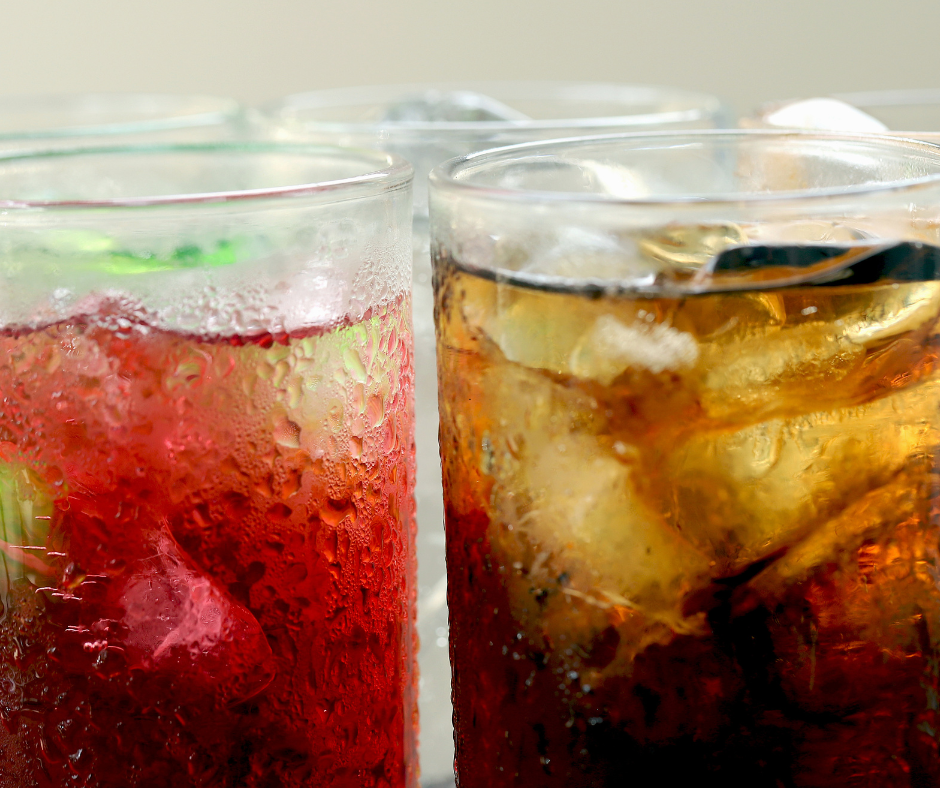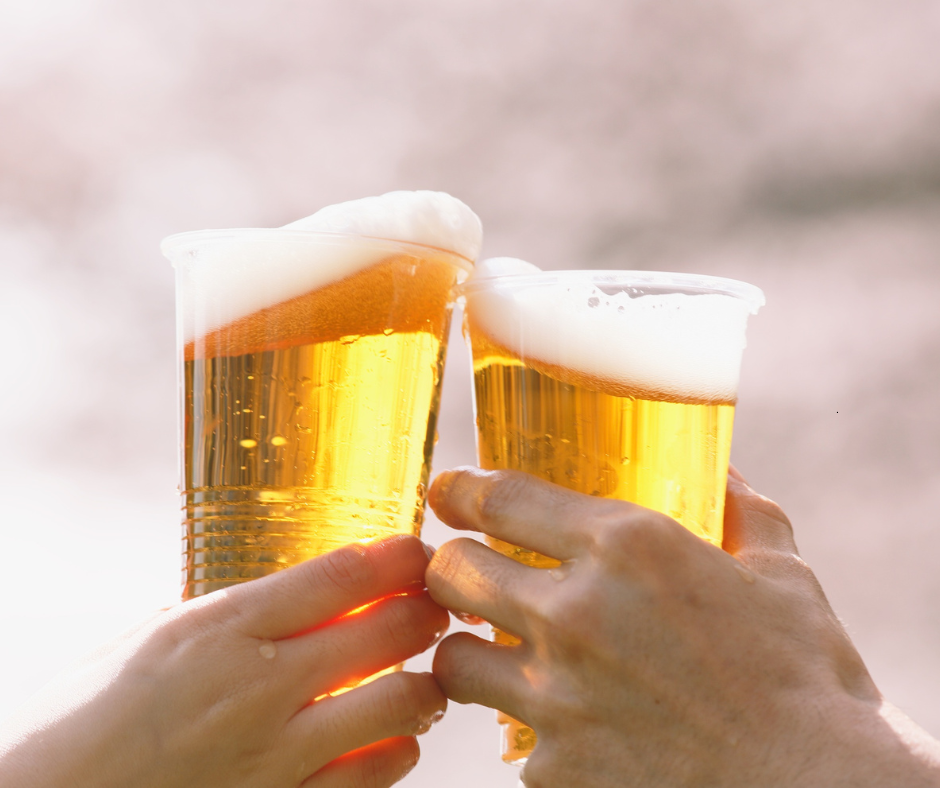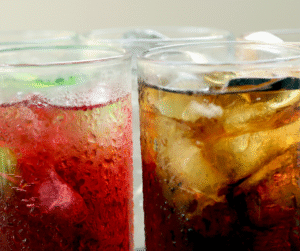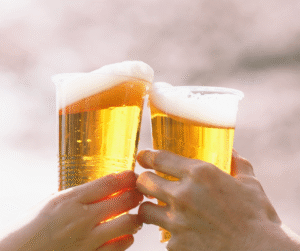You serve a pint, expecting a crisp, refreshing fizz. But instead, your customer gets a dull, lifeless drink. Flat beer is more than just a minor inconvenience—it can hurt your business. Whether you run a bar, pub, or brewery, serving beer that lacks carbonation can lead to customer complaints, lost sales, and a damaged reputation.
Carbonation is crucial for beer quality. It enhances aroma, mouthfeel, and overall drinking enjoyment. Without the right CO₂ levels, beer tastes stale, flat, and unbalanced. A poor drinking experience can mean negative reviews, fewer repeat customers, and a tarnished brand image.
For breweries, a flat, inconsistent pour can undermine the hard work that goes into crafting the perfect beer. For bars and pubs, it can give the impression of poor handling, bad storage, or unmaintained draft systems. If customers don’t get the high-quality pint they expect, they may switch to another venue or brand.
In this guide, the Sure Purity experts explain why beer loses carbonation and provides quick, effective solutions to fix it. Whether you manage a bar, operate a draft beer system, or brew your own beer, you’ll learn how to prevent flat beer, restore carbonation, and keep your customers satisfied with every pour.
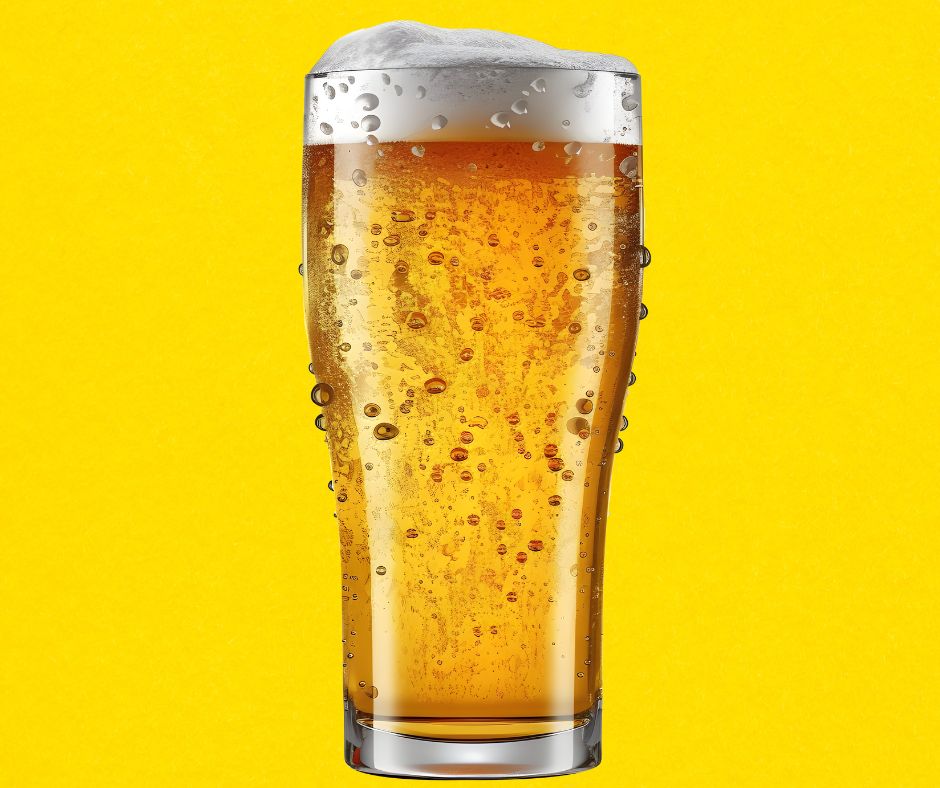
Key Takeaways
- Flat beer happens due to CO₂ loss caused by temperature fluctuations, incorrect pressure settings, poor glassware, or improper storage.
- Maintaining the right temperature and pressure ensures beer retains its carbonation and delivers the intended taste and mouthfeel.
- CO₂ purity is critical—contaminated CO₂ can introduce off-flavours, affect foam retention, and cause inconsistent carbonation.
- Common fixes for flat beer include adjusting CO₂ pressure, using beer-clean glassware, and storing beer at the correct temperature.
- For kegged beer, high-purity CO₂ is essential to maintain carbonation consistency and protect beer quality.
- Sure Purity’s Carboguard Craft system removes CO₂ contaminants, ensuring clean, reliable carbonation for breweries, bars, and beverage producers.
What Is Flat Beer?
Flat beer is beer that has lost its carbonation, resulting in a dull taste, weak aroma, and little to no fizz. A properly carbonated beer should have tiny CO₂ bubbles rising through the glass, forming a foamy head that enhances its mouthfeel and aroma. When beer goes flat, it loses this lively character, making it unappealing to customers.
Not all beers are meant to be highly carbonated. Traditional cask ales, some stouts, and certain Belgian-style beers are brewed to have lower carbonation levels, which complement their flavour profiles. However, if a beer that is supposed to be crisp and effervescent—such as a lager, IPA, or wheat beer—pours flat, something has gone wrong.
Common Misconceptions About Flat Beer
Many people assume that beer naturally goes flat over time, but this isn’t always the case. Here are some common misconceptions:
- “Does beer go flat if left unopened?”
- A sealed bottle, can, or keg maintains its carbonation unless exposed to extreme temperatures or faults in the seal.
- “Can beer go flat if stored incorrectly?”
- Temperature fluctuations, exposure to oxygen, or improper handling can cause CO₂ to escape prematurely.
- “Does warm beer go flat faster?”
- CO₂ is more soluble in cold liquids. When beer is stored or served too warm, it releases CO₂ too quickly, leading to flatness.
If a draft system, storage conditions, or packaging process isn’t properly controlled, beer can lose its carbonation before it reaches the customer. Understanding the role of CO₂ in beer helps prevent these issues.
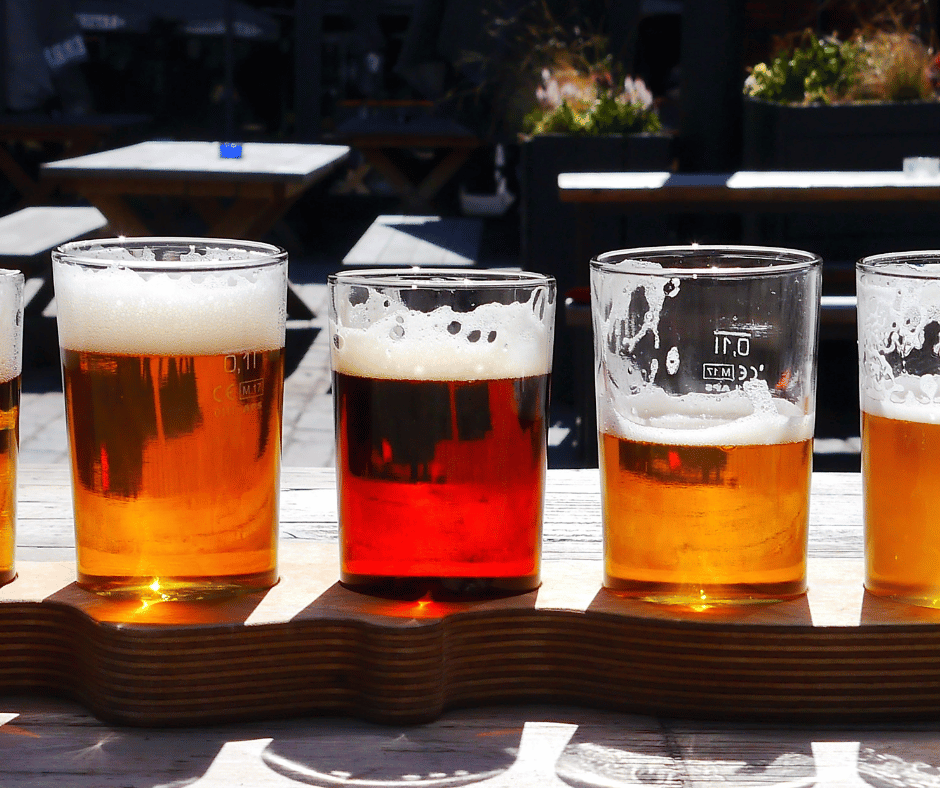
The Role of Carbon Dioxide in Beer
CO₂ is the lifeblood of beer carbonation. It plays a crucial role in the flavour, texture, and overall drinking experience. Proper carbonation ensures:
- Improved texture and mouthfeel – Tiny CO₂ bubbles create a pleasant tingling sensation, making beer more enjoyable.
- Enhanced aroma release – CO₂ carries volatile compounds to the surface, intensifying the beer’s scent.
- Balanced taste perception – The right carbonation level offsets sweetness, enhances bitterness, and gives beer a refreshing quality.
But achieving and maintaining the perfect carbonation isn’t always straightforward. Without CO₂ purity measurements and proper regulation, beer can develop off-flavours, lose its fizz, or become overly foamy.
How Beer Becomes Carbonated
Beer gets its CO₂ in two ways:
1. Natural Carbonation (Fermentation-Produced CO₂)
- During fermentation, yeast converts sugars into alcohol and CO₂.
- In bottle-conditioned beers, the beer is sealed with residual yeast and sugar, allowing natural carbonation to build over time.
- Traditional cask ales also rely on natural CO₂ retention but at much lower levels than other beer styles.
This method produces a gentler, softer carbonation, but it requires precise conditions to maintain consistency.
2. Forced Carbonation (Kegged and Bottled Beers)
- Most commercial beers are force-carbonated by injecting CO₂ under pressure.
- The CO₂ dissolves into the liquid, creating the desired carbonation level before packaging.
- Bars and breweries using kegs or draft systems rely on an external CO₂ supply to maintain proper fizziness.
While forced carbonation ensures consistency, it also depends on the quality of CO₂ being used. Poor-quality CO₂ can introduce unwanted contaminants, leading to taste alterations, loss of head retention, and a flat or inconsistent pour.
How Temperature, Pressure, and CO₂ Purity Affect Carbonation
The ability of beer to retain carbonation depends on three key factors:
1. Temperature Control
- Colder beer holds CO₂ better – This is why draft beer is stored and served at precise temperatures.
- If beer is stored too warm, CO₂ escapes too quickly, leading to flat or foamy pours.
2. Proper Pressure Regulation
- High pressure keeps CO₂ dissolved – In a keg system, CO₂ pressure must be balanced to prevent beer from becoming either too flat or too foamy.
- Incorrect pressure settings can lead to carbonation inconsistencies, affecting drinkability and quality.
3. Why CO₂ Purity Matters
- Many bars and breweries overlook CO₂ purity, assuming all gas supplies are the same.
- Impurities in CO₂, such as benzene, sulphur compounds, and hydrocarbons, can alter beer’s flavour and aroma, causing a chemical aftertaste or poor head retention.
- Sure Purity’s Carboguard Craft System provides a multi-stage filtration process, removing contaminants from CO₂ before it enters the beer. This ensures consistent carbonation, no unwanted flavours, and a better drinking experience.
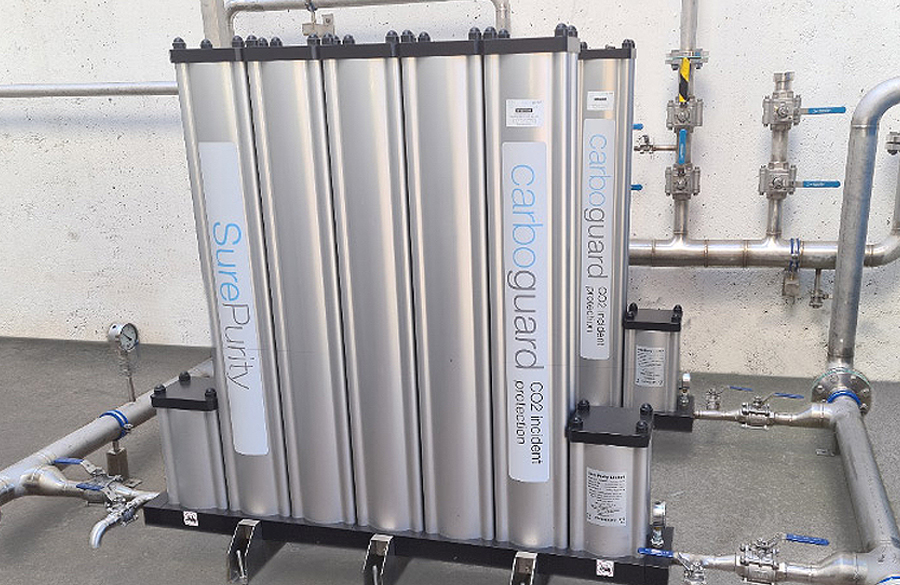
How Sure Purity Helps Maintain Beer Quality
For breweries, pubs, and bars, CO₂ purity is just as important as temperature and pressure control. Sure Purity’s advanced CO₂ filtration technology helps businesses:
- Prevent flat or contaminated beer by removing CO₂ impurities.
- Enhance beer flavour and aroma with ultra-pure carbonation.
- Protect brand reputation by ensuring every pour meets the highest quality standards.
By using our polishing filters, you can avoid issues, reduce wastage, and serve the perfect pint every time.
Carboguard Craft would be suitable for any brewery, the Carboguard Craft is specifically linked to breweries as it was designed to ensure quality of the 5th ingredient in beer. Carboguard Craft polishing filters remove dirt, oil and water (NVOR) and trace chemical impurities present in Carbon Dioxide. Protection from these trace impurities improves the sensory attributes of the beverage such as taste, odour and appearance. It also prevents spoilage of a quality beverage during carbonation and dispensing.
Quick Fixes To Add The “Fizz” Back Into Your Flat Beer
When beer loses its carbonation, it affects taste, mouthfeel, and overall quality. Whether you’re dealing with flat beer in a keg, bottle, or glass, there are several ways to restore its fizz. Here are practical solutions to revive beer and prevent waste.
Restoring Carbonation in Kegged Beer: CO₂ Purging & Re-Pressurisation
If a kegged beer has gone flat, the issue often comes down to CO₂ loss, incorrect pressure settings, or contamination in the gas supply. Re-pressurising the system correctly can restore carbonation and prevent further issues.
How to Fix a Flat Keg
- Check the CO₂ supply – Ensure the tank is full and properly connected to the system.
- Adjust the CO₂ regulator – Set it to the correct PSI (10-14 PSI for most beers).
- Purge the keg – Release any excess oxygen that may be affecting carbonation.
- Re-pressurise and wait – Let the beer sit under pressure for at least 24 hours to allow the CO₂ to dissolve properly.
Why CO₂ Purity Matters for Draft Systems
The quality of CO₂ used in draft beer systems has a direct impact on carbonation, flavour stability, and foam retention. If CO₂ contains impurities like benzene, sulphur compounds, or hydrocarbons, it can lead to off-flavours and poor head retention.
Sure Purity’s Carboguard Craft System ensures that only ultra-pure CO₂ enters your draft system, removing contaminants before they reach the beer. This prevents carbonation inconsistencies, enhances beer quality, and reduces the risk of serving flat pints.
Serving Techniques to Maximise Carbonation
Even when beer retains carbonation, poor serving techniques can make it seem flat. Proper pouring and glassware selection help preserve CO₂ levels and enhance the drinking experience.
Pour at the Right Angle to Retain CO₂
- Always tilt the glass to a 45-degree angle while pouring to reduce CO₂ loss.
- Straighten the glass when it’s ¾ full to create a controlled head.
Use the Right Glassware
- Nucleated glasses (with etched patterns at the base) help maintain carbonation by releasing CO₂ bubbles steadily.
- Avoid detergent residues, which kill carbonation—rinse glasses with cold water before pouring.
Preventing Flat Beer with High-Quality CO₂
For breweries and bars, flat beer is often preventable with the right CO₂ purity and system maintenance. Even if a beer is perfectly carbonated at production, using low-quality CO₂ in draft systems can lead to flat pours and inconsistent carbonation.
Our Carboguard Craft System helps maintain consistent carbonation by:
- Filtering out contaminants that affect CO₂ quality.
- Ensuring beer stays fresh and fully carbonated from keg to glass.
By combining proper storage, precise pressure control, and ultra-pure CO₂, you can eliminate flat beer issues. Protect your brand reputation and ensure every pint meets the highest quality standards, with Sure Purity. Read our full guide to find out why your draught beer is flat.
Why Is My Beer Flat?
Serving flat beer can quickly ruin the reputation of your brand. It’s important to understand exactly why your beer can lose its fizz, so you can prevent it happening in the future. Here are the most common causes of what causes flat beer.
1. Temperature Troubles: The Impact of Heat on Carbonation
Temperature plays a critical role in how well beer retains carbonation. When beer is stored or served at the wrong temperature, CO₂ escapes too quickly, leading to a flat and dull drinking experience.
Why Temperature Fluctuations Cause Flat Beer
- CO₂ dissolves better in cold beer – The colder the liquid, the more CO₂ it retains.
- Warm storage accelerates CO₂ loss – Beer stored at high temperatures will lose its fizz faster.
- Rapid temperature changes cause CO₂ to escape before the beer is served.
Ideal Beer Storage & Serving Temperatures
Keeping beer at the correct temperature is one of the easiest ways to maintain carbonation.
| Beer Style | Ideal Storage Temperature | Ideal Serving Temperature |
| Lager & Pilsner | 3-7°C | 4-7°C |
| Ales & IPAs | 10-13°C | 10-13°C |
| Stouts & Porters | 10-15°C | 12-15°C |
How to Fix It
- Store beer at consistent, optimal temperatures to prevent CO₂ from escaping.
- Avoid warm storage areas (near heat sources, direct sunlight, or warm cellars).
- Ensure draft systems and keg coolers maintain a stable temperature.
2. Poor CO₂ Pressure Levels in Draft Beer Systems
In draft beer systems, balanced CO₂ pressure is essential for keeping beer carbonated. Too much or too little pressure leads to inconsistent pours, excess foam, or flat beer.
How CO₂ Pressure Affects Carbonation
- Too low? CO₂ starts escaping from the beer, causing a flat pour with no head retention.
- Too high? The beer becomes over-carbonated, leading to excessive foaming.
Ideal CO₂ Pressure Settings for Kegged Beer
Different beer styles require different pressure settings to maintain carbonation.
| Beer Style | Ideal CO₂ Pressure (PSI) |
| Lager & Pilsner | 10-14 PSI |
| Ales & IPAs | 12-14 PSI |
| Stouts & Porters | 10-12 PSI |
How to Fix It
- Check CO₂ pressure settings regularly and adjust to the correct PSI for each beer style.
- Ensure the CO₂ tank is full and properly connected to avoid gas leaks.
- Use high-purity CO₂—contaminated gas can affect carbonation and beer flavour.
Sure Purity’s Carboguard Craft System removes impurities from CO₂, ensuring consistent carbonation without off-flavours.
3. Improper Glassware & Cleaning Issues
The glass you serve beer in can directly impact carbonation retention. Dirty or improperly cleaned glassware disrupts CO₂ bubbles, causing beer to lose its fizz faster.
Common Glassware Issues That Cause Flat Beer
- Detergent residue – Soap or chemical residues from improper washing kill foam and carbonation.
- Grease or lipstick on the rim – Oils break surface tension, causing CO₂ bubbles to dissipate.
- Frosted glasses – While it looks appealing, extreme cold can flatten beer faster.
How to Fix It
- Use beer-clean glassware (washed with dedicated beer glass detergent, oil-free, and properly rinsed)
- Rinse glasses with cold water before pouring to remove any detergent residue.
- Use nucleated glasses (etched at the bottom) to help maintain carbonation.
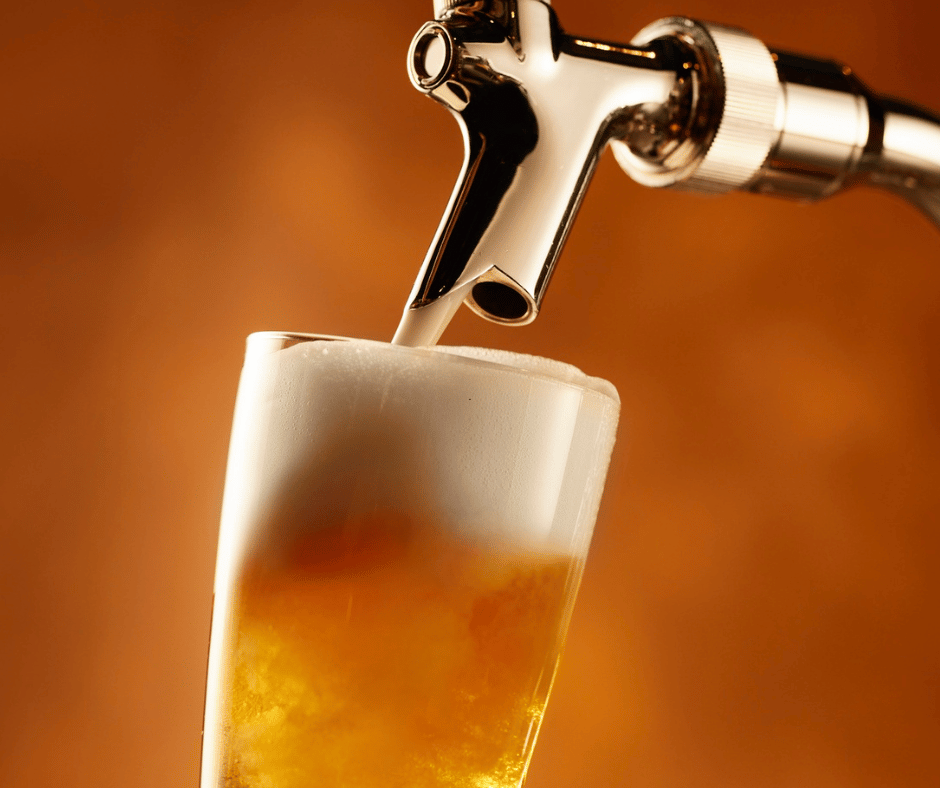
4. Faulty Draft Beer Equipment & Poor Maintenance
If a draft beer system isn’t properly maintained, CO₂ levels can become inconsistent, leading to flat or foamy beer.
Signs of Draft System Issues
- Cloudy beer? Your beer lines may be dirty, causing off-flavours and CO₂ loss.
- Flat beer? Possible causes include leaky connections, worn-out seals, or CO₂ pressure issues.
How to Fix It
- Clean beer lines every two weeks to remove yeast build-up and contaminants.
- Inspect faucets, seals, and keg couplers for leaks.
- Purge and replace CO₂ tanks regularly to avoid pressure fluctuations.
Using high-purity CO₂ ensures a clean, consistent pour without contamination. Sure Purity’s Carboguard Craft System removes harmful contaminants, protecting carbonation and beer quality.
5. Stale or Expired Beer
Even with proper handling, beer will eventually lose carbonation as it ages. The oxidation process causes CO₂ to escape, leading to a flat, dull taste.
Storage Factors That Affect Carbonation
- Light exposure – UV rays break down beer compounds, leading to a “skunky” off-flavour.
- Oxygen contact – Even small amounts of oxygen cause oxidation, which flattens beer.
- Time – Over time, beer naturally loses its carbonation, especially if not stored correctly.
How to Fix It
- Check expiration dates before serving beer.
- Store beer in a dark, cool place to prevent UV and oxidation damage.
- Use kegs with minimal oxygen exposure to extend shelf life.
Frequently Asked Questions About Flat Beer
How long does it take beer to go flat?
Beer can start losing carbonation within 30 minutes to an hour once poured into a glass. Factors like temperature, exposure to air, and agitation can accelerate this process. If left open, bottled or canned beer may take several hours to a day to go completely flat, depending on how much CO₂ was retained in the liquid. Kegged beer will only go flat if the CO₂ pressure is too low or if it is exposed to oxygen.
Why might beer lose its carbonation after pouring?
There are several reasons beer may go flat after being poured:
- Dirty glassware – Residue from soap or grease kills carbonation.
- Incorrect pouring technique – Pouring too aggressively releases CO₂ too quickly.
- Temperature fluctuations – Warm beer releases CO₂ faster.
- Extended exposure to air – CO₂ dissipates when beer sits too long.
- Faulty draft system – Leaky connections or low CO₂ pressure can cause rapid CO₂ loss.
How does the purity of CO₂ affect beer?
The purity of CO₂ directly impacts beer quality, carbonation consistency, and overall taste. Contaminated CO₂ can introduce off-flavours, poor head retention, and inconsistent carbonation levels.
Impurities commonly found in CO₂ include:
- Benzene and hydrocarbons – Cause chemical or solvent-like flavours.
- Sulphur compounds – Create rotten egg or metallic tastes.
- Oxygen – Speeds up oxidation, making beer taste stale.
- Moisture and microbial contaminants – Can cause hazy beer or spoilage.
Using high-purity CO₂ ensures beer maintains its intended flavour profile and carbonation stability. Sure Purity’s Carboguard Caft filtration system removes harmful contaminants from CO₂, helping breweries and bars maintain beer quality, reduce wastage, and ensure a crisp, consistent pour.
Can flat beer get you drunk?
Yes, flat beer still contains alcohol, so it can get you drunk just like carbonated beer. The CO₂ does not impact the alcohol content, but the drinking experience may feel different. Some people may drink flat beer faster due to the lack of carbonation, which can lead to quicker alcohol absorption.
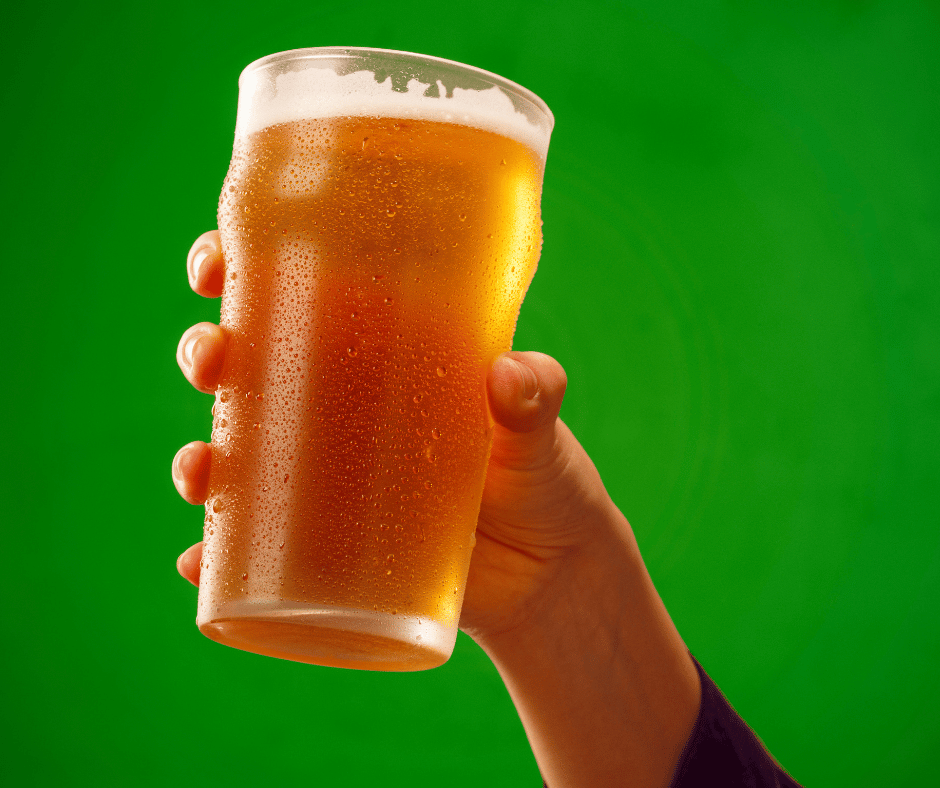
Can flat beer make you sick?
Flat beer is not necessarily unsafe to drink, but its quality and taste may be compromised. The biggest concerns are:
- Oxidation – Leads to stale or unpleasant flavours.
- Bacterial growth – Rare, but possible if beer was exposed to contaminants over a long period.
- Expired beer – Over time, ingredients may degrade, affecting safety and flavour.
If the beer smells or tastes off, it’s best to discard it.
Can you drink flat beer?
Yes, flat beer is safe to drink, but it may not be enjoyable. Carbonation enhances flavour, aroma, and mouthfeel, so a flat beer can taste dull and lifeless. Some people repurpose flat beer for cooking, marinades, or baking rather than drinking it.
Does flat beer lose alcohol?
No, flat beer does not lose alcohol. Alcohol content is determined during fermentation and does not change when beer goes flat. However, if beer is left open for an extended period, evaporation could slightly reduce alcohol concentration, but this would take a significant amount of time.
Why does a wet glass make beer go flat?
A wet glass can cause beer to lose carbonation faster, but it depends on how the glass was rinsed.
- A clean, wet glass helps maintain carbonation by reducing nucleation sites where CO₂ escapes.
- A glass with soap or grease residue disrupts CO₂ bubbles, making beer go flat quickly.
For best results, rinse glasses with cold water before pouring to remove any lingering residues.
How to carbonate flat beer?
There are several ways to restore carbonation:
- For kegged beer – Adjust CO₂ pressure and re-pressurise for 24 hours.
- For bottle-conditioned beer – Add a small amount of priming sugar and reseal to restart natural fermentation.
- For home drinkers – Use a CO₂ injection system, like a SodaStream, to force carbonate beer.
- For a quick fix – Agitate the beer slightly to reintroduce some dissolved CO₂.
Does beer go flat if it’s warm?
Yes, warm beer goes flat faster because CO₂ solubility decreases at higher temperatures. When beer is stored or served too warm, CO₂ escapes more rapidly, leading to weaker carbonation and a flat taste. Keeping beer at the correct temperature helps maintain its carbonation.
Does flat beer mean it’s off?
Not always. Flat beer can result from CO₂ loss rather than spoilage. However, if beer also has a sour smell, cloudy appearance, or unusual taste, it may have gone bad due to oxidation or contamination. Checking expiry dates and proper storage conditions helps prevent spoiled beer.
Final Thoughts
Flat beer is a preventable issue that often stems from CO₂ loss due to temperature fluctuations, incorrect pressure settings, poor storage, or equipment problems. Whether you run a brewery, manage a bar, or operate a draft beer system, understanding how to maintain carbonation ensures every pint is served at its best.
The quickest fixes for flat beer include adjusting CO₂ pressure, maintaining the right storage temperature, using properly cleaned glassware, and ensuring draft systems are regularly serviced. But prevention is always better than a cure.
By keeping beer cold, properly sealed, and well-maintained, you can avoid carbonation loss and preserve the quality of every pour. For kegged beer, ensuring a clean, high-purity CO₂ supply is just as important as temperature and pressure control.
If your beer is losing its fizz, we’d love to help. Sure Purity’s CO₂ filtration systems remove contaminants that can affect carbonation, flavour, and foam stability. Whether you run a brewery, craft beer taproom, pub, bar, restaurant, or beverage production facility, maintaining the purity of your CO₂ supply is crucial for delivering a consistently high-quality pour.
Our Carboguard Craft system ensures that only clean, contaminant-free CO₂ enters your draft system, preventing flat beer, unwanted off-flavours, and inconsistent carbonation. With better control over your CO₂ quality, you’ll serve beer that retains its intended taste, aroma, and effervescence, keeping customers satisfied and protecting your reputation.
Get in touch to see how we can help you maintain exceptional beer quality with every pour.

